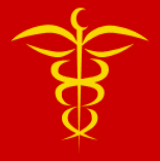BUN (Blood Urea Nitrogen)
| Urea is a waste product, formed in
the liver and excreted in the urine at a relatively constant rate.
BUN (blood urea nitrogen) is a measurement of the nitrogen part of
urea, and is therefore an indirect measurement of the urea in the
bloodstream.
Elevations caused by:
- Kidney malfunction, as is seen in glomerulonephritis, pyelonephritis,
and shock.
- Increased metabolism of proteins, as is seen with GI bleeding, a
high protein meal, heart attack, diabetes, or infection.
- Dehydration and hemoconcentration
- Crush injuries
Decreases caused by:
- Liver failure
- Normal Pregnancy
- Excessive hydration
Note:
- BUN is a fast way to evaluate kidney function, but has some
limitations.
- Small changes in BUN may occur from medications, dietary changes and
hydration status and have little significance.
- Big changes in BUN occur only in fairly extreme circumstances.
- A more sensitive (but more complex) test of kidney function is the
creatinine clearance.
- With an elevated BUN, one way to distinguish between renal disease
and increased production of urea (such as is seen in GI bleeding) is
the BUN/creatinine ratio. It increases with increased metabolism, and
decreases with renal disease.
|
Normal Values:*
| |
mg/dL |
| Adults |
8-23 |
|
Children |
5-15 |
| Pregnancy |
5-12 |
*These are general values taken from a variety of
sources. The actual normal values may vary from lab to lab and from one
type of testing protocol to another.
|
|
|
Approved for public release;
Distribution is unlimited.
The listing of any non-Federal product in this CD is not an endorsement of the
product itself, but simply an acknowledgement of the source.
Bureau of Medicine and Surgery
Department of the Navy
2300 E Street NW
Washington, D.C
20372-5300 |
Operational Medicine
Health Care in Military Settings
CAPT Michael John Hughey, MC, USNR
NAVMED P-5139
January 1, 2001 |
United States Special Operations
Command
7701 Tampa Point Blvd.
MacDill AFB, Florida
33621-5323 |
*This web version is provided by
The Brookside Associates Medical Education Division. It contains
original contents from the official US Navy NAVMED P-5139, but has been
reformatted for web access and includes advertising and links that were not
present in the original version. This web version has not been approved by the
Department of the Navy or the Department of Defense. The presence of any
advertising on these pages does not constitute an endorsement of that product or
service by either the US Department of Defense or the Brookside Associates. The
Brookside Associates is a private organization, not affiliated with the United
States Department of Defense.
Contact Us · · Other
Brookside Products

|
|
Operational Medicine 2001
Contents
|
|

